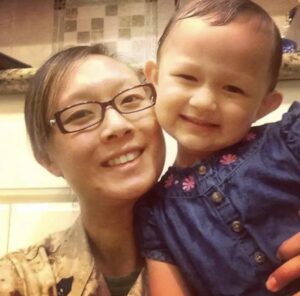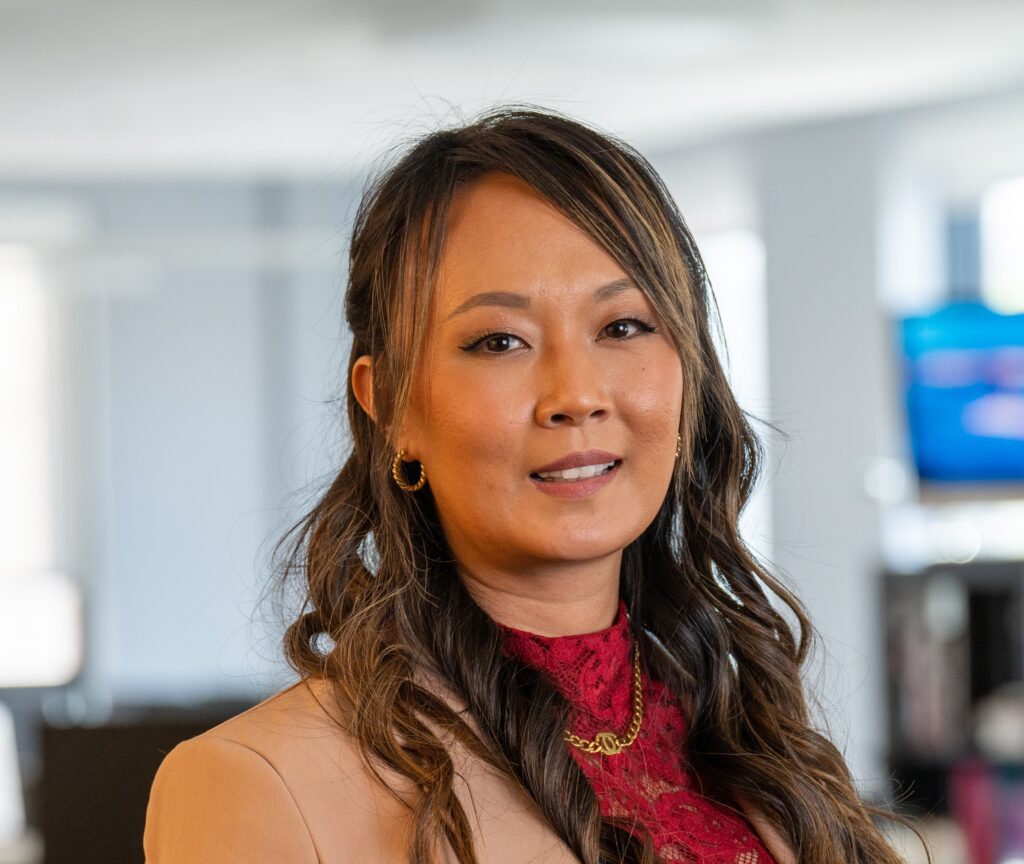Goodbye Marine Corps, Hello…? A Post-Military Guide for Women Veterans
March 13, 2023The transition from active duty to veteran or retiree family can be as confusing as it is exciting. Through the Transition Tales series, MFAN’s Advisory Board combines personal experience with practical advice and resources to assist the whole family through this complex adjustment period.
The opinions in this column are the views of the author, Hana Romer.

I remember my last day in the Marine Corps clearly. After ten years of the only life I had known since high school, I laced up my combat boots one final time. I snapped a quick selfie with my daughter to commemorate the last time I would drop her off at daycare in uniform. It was a bittersweet day.
The year leading up to that point was challenging. My husband returned from Afghanistan, and immediately got orders to Boston. I remained alone with our daughter at Camp Pendleton, California for the last year of my own service in the Marine Corps. When that day arrived, I was so overwhelmed with excitement to finally be with my husband that I failed to do any proper planning to transition out of the military.
Because of that, my first year as a “civilian” was one of the most difficult years of my post–military life.
One of the hardest parts for me was losing my sense of identity and purpose. The military is not just a “job” but an entirely immersive experience. When I found myself not having to wake up every morning and put on a uniform, I felt like my life had no meaning.
As a woman Marine, I felt “special.” I was one of “the fewer, the prouder”—the 8% of the entire Marine Corps! I was constantly praised for succeeding in a male-dominated space. And now, I was a stay-at-home mom having tea parties with my three-year-old. My ego was bruised, and I wasn’t feeling fulfilled. This put me into a deep depression, and even worse, watching my husband put on his uniform every day made me start to resent him out of pure jealousy.
While both men and women veterans experience the loss of identity and purpose, women face more isolation. For example, I don’t feel welcome in veterans’ spaces. I am often told to thank my husband for his service, and my status as a veteran is completely ignored and invalidated.
Fortune highlighted that women veterans experience loneliness at higher rates than men, contributing to the increase in rates of suicide among women veterans. Type the phrase “why women don’t feel accepted in veterans’ spaces” into your Google search bar, and you can scroll through hundreds of articles on this topic.
Another difficult part of getting out was losing my income. My husband and I had been a dual-income family for the entirety of our marriage. However, we had both decided I would be a stay-at-home mom after I got out—I also became pregnant with our second child that year.
We were unprepared and our family struggled to make ends meet. As I share this, I recognize I had privilege because my husband had a full-time career when I got out. Unfortunately, many women veterans leave the military without financial support and resources, leading to homelessness and unemployment at higher rates than men. The 2021 Annual Warrior Survey by Wounded Warrior Project found that women veterans earned $100 less per week than their male counterparts—even though they are statistically more educated than men.
Every service member, from all branches and all ranks, will find themselves at a point when they must leave the military—voluntarily or involuntarily. While this sentiment can be true of careers in the civilian sector, the transition out of the military is one of the most unique and often most difficult experiences one can go through, and even more so for women.
According to the Department of Veterans Affairs, women are the fastest-growing population of veterans in the VA system. And because women’s military experiences differ from men, putting them in a “one size fits all” box when it comes to transition support and resources is a considerable disservice. Therefore, over the last several years, a sizable effort has been made to highlight the unique nature of women veterans’ experiences and provide the necessary support tailored for them.
I have three key pieces of advice for women transitioning from the military:
1. Find your new purpose
The military does a great job of defining our purpose and instills a lot of pride in our uniform and the job we are asked to do. You now have to find that outside of uniform. What are you passionate about? How can you contribute your talents towards something that will give you meaning? I wanted to continue to give back to the military and veteran community. I felt I had a unique voice not only as a woman veteran but as a military spouse as well. I wanted to use it to make my military community better.
Currently, I volunteer at MFAN and several other military service organizations. I get to be the voice for women veterans and military spouses. It has given me purpose, and I still get to serve the military community in a capacity outside of uniform.
2. connect with your va facility’s women services
Every VA facility has a women’s services program. The VA has made a concerted effort to provide specialized care, support, and resources specific to women veterans. Unfortunately, these services are often underutilized, so please take advantage of them! In addition, the staff providing these services are all women equipped to work with women veterans.
3. get plugged into an online community
As mentioned earlier, as a woman veteran, I don’t feel welcome in “traditional” veterans’ spaces. Thankfully, in the age of social media, it’s easy to get plugged in online with like-minded individuals. I am a member of several Facebook and LinkedIn groups only for women veterans. These groups have truly been some of my favorite spaces to connect with other women and where I feel safe and supported to voice questions or concerns. Some of these groups offer in-person gatherings occasionally as a way to connect with the online community. As a card-carrying member of the Women Marines Association, I get to attend their convention every two years. These conventions are a fun way to reconnect with fellow women Marines (in fun locations!) and gain access to helpful tools and resources that support our community!
The first year out of the Marine Corps came with many challenges for me. I dealt with a lot of mental health issues which caused a lot of marital problems. There were times when we were drowning in so much debt that I didn’t think we’d ever get out of it. Small tasks like grocery shopping gave me so much anxiety because I feared my card would be declined. I regretted getting out of the military and blamed myself for putting my family in our financial nightmare. I cried a lot more than I care to admit during that phase of my life. Looking back, it was a really dark year for me.
However, as a woman Marine, I still had some fight left in me.
I sought individual counseling, and my husband agreed to marriage counseling. We sold a home we had rented out, and I went to college using my GI Bill. These things eased our financial burden. Slowly but surely, I crawled out of my “fighting hole,” feeling like myself again. I hope my story gives anyone facing the inevitable “end of military service” some hope. Give yourself some grace, and take it day by day. You will be better for it.
resources for women veterans
- Women Veterans Call Center (855-829-6636): This free and confidential service is available to help you navigate the VA, point you in the right direction, and connect you with your local VA’s Women Veterans Program Manager. All the call center operators are women (primarily veterans themselves) and are there to help you. The website also has a chat and text feature if that is more convenient for you.
- Make the Connection: This is an online mental health awareness campaign launched by the Department of Veterans Affairs in 2011. The website features the mental health journeys of hundreds of veterans from all eras and branches of services. A feature that the website offers is the ability to filter the stories and videos by gender. This is a great way to hear the mental health stories of other women veterans and hopefully show others that they are not alone.
- Women Veterans Alliance: This service provides an online and offline community of local women veteran networking groups, community events, and national conferences that provide opportunities for women veterans to connect. In addition, they provide resources and assistance for career and networking opportunities, education, and transition services. They are a one-stop shop for just about any resource you may need as a woman veteran!
active branch-specific women veterans organizations
About the Author
